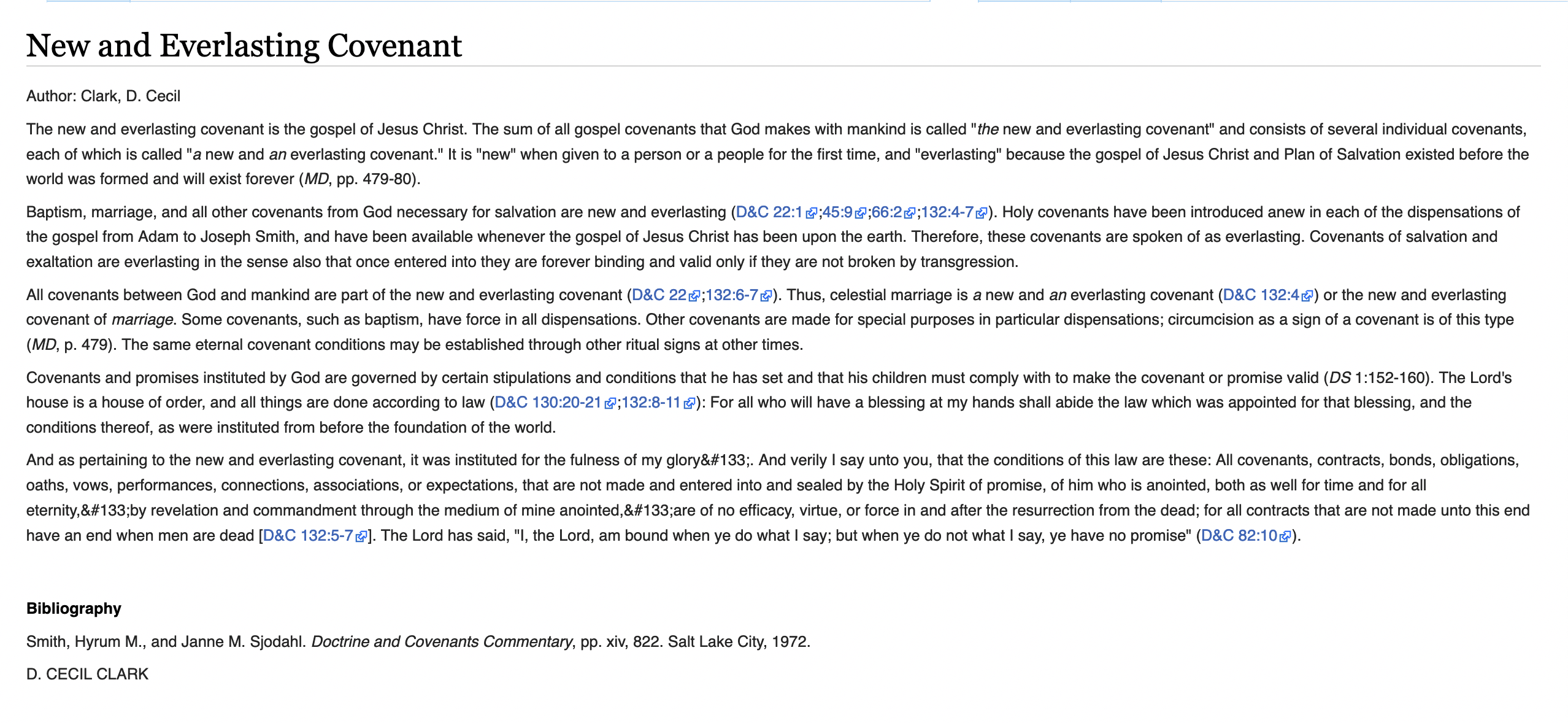The "new and everlasting covenant" is the sum of all covenants and ordinances in the gospel of Jesus Christ.
- Type
- Book
- Source
- D. Cecil Clark LDS
- Hearsay
- DirectSecondary
- Reference
D. Cecil Clark, "New and Everlasting Covenant" in Encyclopedia of Mormonism, 4 vols., edited by Daniel H. Ludlow, (New York, Macmillan Publishing, 1992), 2:856, 859
- Scribe/Publisher
- MacMillan Publishing Company
- People
- D. Cecil Clark
- Audience
- Reading Public
- Transcription
Author: Clark, D. Cecil
The new and everlasting covenant is the gospel of Jesus Christ. The sum of all gospel covenants that God makes with mankind is called "the new and everlasting covenant" and consists of several individual covenants, each of which is called "a new and an everlasting covenant." It is "new" when given to a person or a people for the first time, and "everlasting" because the gospel of Jesus Christ and Plan of Salvation existed before the world was formed and will exist forever (MD, pp. 479-80).
Baptism, marriage, and all other covenants from God necessary for salvation are new and everlasting (D&C 22:1;45:9;66:2;132:4-7). Holy covenants have been introduced anew in each of the dispensations of the gospel from Adam to Joseph Smith, and have been available whenever the gospel of Jesus Christ has been upon the earth. Therefore, these covenants are spoken of as everlasting. Covenants of salvation and exaltation are everlasting in the sense also that once entered into they are forever binding and valid only if they are not broken by transgression.
All covenants between God and mankind are part of the new and everlasting covenant (D&C 22;132:6-7). Thus, celestial marriage is a new and an everlasting covenant (D&C 132:4) or the new and everlasting covenant of marriage. Some covenants, such as baptism, have force in all dispensations. Other covenants are made for special purposes in particular dispensations; circumcision as a sign of a covenant is of this type (MD, p. 479). The same eternal covenant conditions may be established through other ritual signs at other times.
Covenants and promises instituted by God are governed by certain stipulations and conditions that he has set and that his children must comply with to make the covenant or promise valid (DS 1:152-160). The Lord's house is a house of order, and all things are done according to law (D&C 130:20-21;132:8-11): For all who will have a blessing at my hands shall abide the law which was appointed for that blessing, and the conditions thereof, as were instituted from before the foundation of the world.
And as pertaining to the new and everlasting covenant, it was instituted for the fulness of my glory…. And verily I say unto you, that the conditions of this law are these: All covenants, contracts, bonds, obligations, oaths, vows, performances, connections, associations, or expectations, that are not made and entered into and sealed by the Holy Spirit of promise, of him who is anointed, both as well for time and for all eternity,…by revelation and commandment through the medium of mine anointed,…are of no efficacy, virtue, or force in and after the resurrection from the dead; for all contracts that are not made unto this end have an end when men are dead [D&C 132:5-7]. The Lord has said, "I, the Lord, am bound when ye do what I say; but when ye do not what I say, ye have no promise" (D&C 82:10)
Bibliography
Smith, Hyrum M., and Janne M. Sjodahl. Doctrine and Covenants Commentary, pp. xiv, 822. Salt Lake City, 1972.
- Citations in Mormonr Qnas
The B. H. Roberts Foundation is not owned by, operated by, or affiliated with the Church of Jesus Christ of Latter-day Saints.

